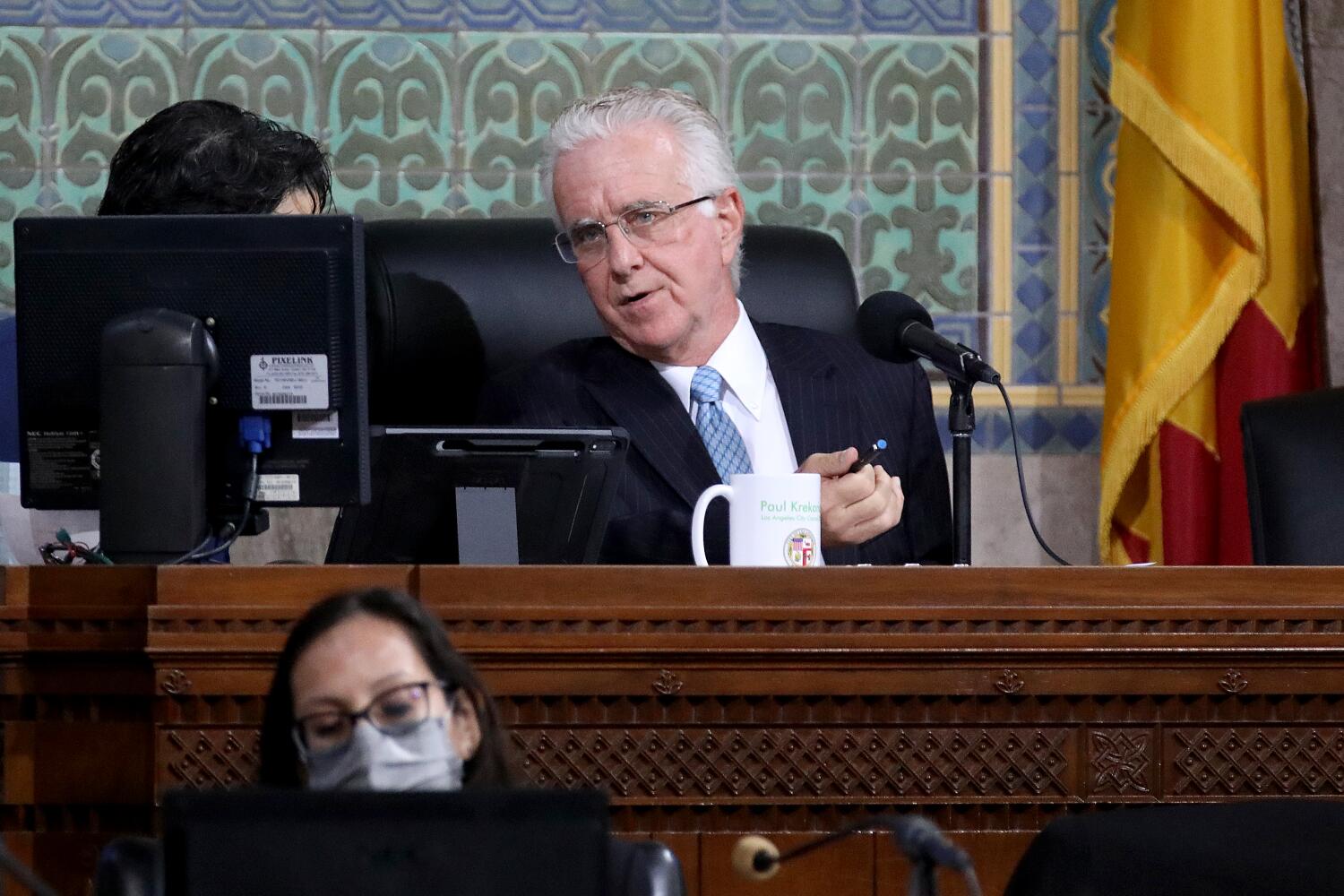
The Los Angeles City Council voted Tuesday to form a new citizens committee to consider expanding the size of the council, reducing the number of council meetings and other potential changes to city operations.
The 13-member committee will be tasked with developing a proposal for the November 2026 ballot that would amend the city charter, which sets out the powers and responsibilities of city departments, offices and elected officials.
The idea of expanding the council to 15 members has been circulating for several years, and some council members have signed on to the idea. City Council President Paul Krekorian had hoped to send the City Council expansion measure to Los Angeles voters in November.
Although a council committee spent months working on the concept, its members never agreed around a single strategy, leaving the issue to the new committee.
The expansion of the council has the support of many civic groups, who believe it will improve community representation at City Hall and diversify the council’s membership.
Godfrey Plata, deputy director of the nonprofit LA Forward, said his organization and others were disappointed by the committee’s failure to act.
“We think it would be a delay to give it to the Charter Commission,” said Plata, whose group last year advocated increasing the commission’s membership to 29 members. “But we’re certainly eager to continue the public conversation around it.”
Krekorian, who faces term limits at the end of the year, continues to advocate expansion, noting that the city of nearly 4 million people has the same number of districts as it did nearly a century ago, when the population was much smaller.
He said reducing the size of each constituency would make the council more responsive to residents while also reducing the influence of “institutional organizational money” in elections.
“I think it might even reduce the risk of corruption,” Krekorian said during an appearance at the Los Angeles Current Affairs Forum last week.
Krekorian said the new charter reform commission will also look at other issues, including the city’s handling of real estate development, the process for filling vacant council seats and the process for reprimanding or suspending elected officials who engage in inappropriate behavior.
Michael Feinstein, speaking on behalf of the Los Angeles County Green Party, called on the commission to ensure it also considers significant changes to city elections, including the adoption of “ranked choice” voting that would allow voters to be ranked Arrange candidates in order of preference rather than choosing just one.
The last major reform of the city charter was in 1999. On the same ballot, voters rejected an effort to expand the commission.
This time around, it’s unclear how broad the committee’s work will be. While the council can propose research topics, the committee will also gather input from a wide range of individuals and community groups.
Under the plan approved Tuesday, Mayor Karen Bass will have the power to appoint four of the commission’s 13 members. Krekorian will select two, as will Council President-elect Marqueece Harris-Dawson.
The eight will be appointed in August and September, according to a schedule set by the committee. Once the meeting is held, they will spend three months developing a work plan and selecting five additional commissioners.
The commission’s schedule calls for it to spend much of 2025 deliberating and gathering public input. In January 2026, its proposals will be presented to the Council, which will then decide which proposals will appear on the November 2026 ballot.
Feinstein, the former mayor of Santa Monica, criticized the arrangement and warned that the council would have the power to reject any proposal from the council. He also accused the commission of allowing it to be staffed by political appointees.
“this [process] There is a direct conflict of interest for the City Council in determining its future size and powers.
The Charter Reform Committee is also expected to consider whether to reduce the number of council meetings — a topic that has angered some council members in recent months.
The city charter requires the council to meet at least three days a week. Councilmembers Katy Yaroslasvky, Tim McOsker and Eunisses Hernandez recently supported a ballot initiative to reduce that number to one day a week. But other members of the committee opposed the idea and said it needed to be reviewed by a soon-to-be-formed committee.
Separately, the council voted Tuesday to approve language for two city charter amendments on the Nov. 5 ballot. One would establish an independent redistricting process for the Los Angeles Unified School District, which covers 26 cities and is governed by a seven-member board of trustees.
Another ballot measure seeks to strengthen the city’s Ethics Commission, which enforces laws on campaign fundraising, lobbying and other political activities. Under the proposal, the agency would receive at least $7 million in annual operating funding.
Supporters say it would prevent elected officials from retaliating against the agency by cutting budgets. The proposal would also triple fines for ethics violations and give ethics boards the ability to hire their own attorneys in certain cases.

